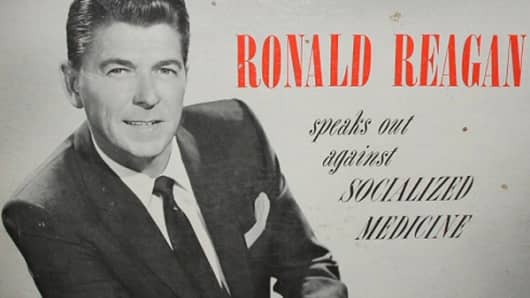Today's news that GE is truly getting back to its roots and once again become a pure play industrial company is a big focus on Wall Street right now. But it's more than a financial story. It's also a throwback to a key period of American history and political lore that created a different kind of American leader.
Ronald Reagan followed a uniquely private sector path to the presidency, and much of that path was paved by General Electric. During his eight years with the company serving as its "Travelling Ambassador," Reagan was seen by most of the public as the weekly host of "General Electric Theater" on TV. But the other part of his GE deal was meeting and speaking to the company's quarter of a million employees at about 140 factories in 40 states.
Read MoreGE CEO Immelt: I'm just a baby, I'm not leaving
The experience gave Reagan a chance to interact with real American workers at a time when his future election rivals were deeply inside the political bubble of the incestuous Washington elites, lobby groups, Wall Street tycoons, and power-mad union leaders. Now Reagan was no babe in the woods when he started with GE in 1954. He had weathered the Great Depression as a young man in Illinois. He had pushed his way on the air at a major radio station, despite no experience, after finishing college. He'd become a success as a steady working Hollywood actor and then as the trusted leader of the Screen Actors Guild. But we learn the most in life when we discover how much we don't know, and Ronald Reagan first discovered what he didn't know when he toured those GE plants. And then he learned more about the economic and aspirational soul of America than any other future politician has ever learned since. The eight year tour turned him from being a New Deal Democrat into a solid conservative who understood economic freedom and the benefits of limited government. More importantly, it forced him to learn how to make speech after speech touting those ideals. And after a few years, he got very good at it.
But he did all that for the GE of old. When GE was just a major appliance and heavy industrial manufacturer, it had a much different employee and management culture and reach across the country. Flash forward 30-35 years and can you imagine Ronald Reagan being able to learn much or connect with the Wall Street types at GE Capital? How about if he came in to talk to some of his old Hollywood buddies at NBC when GE owned the network? Sure, they might have loved seeing their old pal but would they sit through and really listen to him giving a speech on economic ideals? Reagan's political calling card was his enormous appeal to the common American. He really spoke to them and they really spoke to him. If the GE of the 1950's was as much of a Wall Street/Hollywood company that it became in the 1980's, then there's a very good chance Ronald Reagan would never have become President of the United States. But it wasn't, and merely four years after his tour of duty with GE ended, Reagan was elected Governor of California in a landslide.
Read MoreHillary: What she needs to do to not beat herself
It's hard to think of an American company today that could provide a similar education and priceless exposure to a budding politician. Wal-Mart or the big oil companies could certainly give someone a great education that goes beyond the often unfair headlines and Washington-based stereotypes against those companies. But they are already so politicized and polarizing that it's unlikely any lessons could be learned without all the wedge issue noise surrounding them. Apple could provide great leadership and innovation lessons, but with its manufacturing overseas there would be no chance to really interact with a good number of rank and file employees.
But I remain hopeful that such an opportunity at some American company still exists. And if it does, wouldn't it be great if a future candidate for higher office honed his or her message after being exposed to that company's workers and executives as opposed to "training" with the usual suspects in the media, academia, and on Wall Street?
Of course it would.



